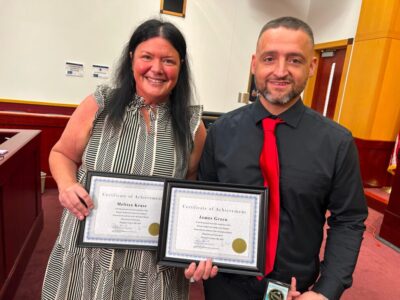ASK AUGUSTINE
Isn’t it true that the church has never been able too define when life begins? I recall Nancy Pelosi once saying that even though St. Augustine set it at three months, it’s only been over the past 50+ years that the church has said life begins at conception.
Your question is most timely since on Jan. 13, 1984, then President Ronald Reagan designated Jan. 22 of each year as National Sanctity of Human Life Day. He chose that date because it was on Jan. 22, 1973 that, in his words, “that in Roe v. Wade, the Supreme Court struck down our laws protecting the lives of unborn children.” (January 17, 1986 issue of NY Times)
A few years ago when then Speaker Pelosi said the church has only had the “life begins at conception” philosophy for about 50 years she made a gross factual error. Then by adding St. Augustine put it at three months, she made an historical error involving the greatest theologian of Christianity’s first 1,000 years.
It is true that secular laws and penalties concerning abortion have evolved through the ages; BUT without question the Christian Church from its earliest days has always held to a firm anti-abortion attitude. The church has always unwavering held to this doctrine regarding the sanctity of life. One of the earliest documents of the early church fathers is “The Didache (The Teaching of the Twelve Apostles)” illustrates that the church’s teaching on abortion has always been quite clear. Some have dated this document as early as 50 AD, but most suggest that it was composed around 70 AD. In this very early summary of basic instruction about the Christian life we read, “You shall not abort a child” (2.2).
Regarding Pelosi’s reference to Augustine, initially I thought she meant St. Thomas Aquinas, the 13th century theologian who subscribed to a “delayed hominization” or “ensoulment” theory, meaning that the fetus did not receive a soul until a certain point (about the time that a mother feels a baby move) in its development. Aquinas speculated that an embryo gets a soul at the point of “quickening,” the time when a woman can feel the baby move, which would be about three months, but this would have no bearing on when life begins and hence abortion. There is no way to read into any of his writings that Aquinas (or Augustine) would have accepted abortion.
Augustine did address abortion in “The Enchiridion.” In chapter 86 he wrote, “At what time the infant begins to live in the womb: whether life exists in a latent form before it manifests itself in the motions of the living being. To deny that the young, who are cut out limb by limb from the womb, lest if they were left there dead the mother should die too, have never been alive, seems too audacious.” In both of these cases Augustine is dealing with our regeneration or re-birth and not our natural life. Nor is there anything in Augustine’s writings to suggest that he would endorse abortion.
Pelosi’s office later said her views on when life begins were informed by the views of Saint Augustine when he wrote, “the law does not provide that the act (abortion) pertains to homicide, for there cannot yet be said to be a live soul in a body that lacks sensation.’ (Saint Augustine, On Exodus 21:22). But the verse in Exodus about which Augustine was writing clearly supports protecting the unborn — for it says, “If men fight, and hurt a woman with child, so that she gives birth prematurely (a live birth, yatza in Hebrew, thus not a miscarriage which would require the verb to be accompanied by some form of muth, meaning to die), yet no harm follows, he shall surely be punished accordingly as the woman’s husband imposes on him; and he shall pay as the judges determine.” Therefore, it is doubtful that Augustine was circumventing Moses.
For those who wonder what today’s leading scientists say on this matter of when life begins: Dr. Hymie Gordon (Mayo Clinic) states, “By all criteria of modern molecular biology, life is present from the moment of conception;” Dr. Micheline Matthews-Roth (Harvard University Medical School) says “It is scientifically correct to say that an individual human life begins at conception;” Dr. Alfred Bongioanni (University of Pennsylvania) writes, “I have learned from my earliest medical education that human life begins at the time of conception;” and Dr. Jerome LeJeune, (The Father of Modern Genetics,” University of Descartes, Paris) concludes, “To accept the fact that after fertilization has taken place a new human has come into being is no longer a matter of taste or opinion . . . it is plain experimental evidence.”
In the final analysis, what really matters is not what Reagan, Pelosi, Augustine, the Church or the world’s leading scientists say about when life begins, but what does God’s word in the Bible teach about it. The principle of the sanctity of life is clearly established in Genesis 9:6 and in the Ten Commandments (Exodus 20). The biblical teaching of the creation of man in the image and likeness of God (Genesis 1:27) is the foundation of the dignity and sacredness of human life. And Psalm 51:5; 139:13, 14; Jeremiah 1:5; and Luke 1:44 (among many other passages) provide evidence that the image of God is present in the unborn human being.
As Christians we must reflect on our responsibility in a society where human life is regarded cheaply by Pelosi and others. What kind of society will we be become when human life is regarded as disposable? Then all of us will be vulnerable.
A human life begins at conception. On this matter, at least, the church and science — Roman Catholics and Evangelical Protestants are in full agreement. And beloved reader be assured that God knew you even before you were formed in the womb.



